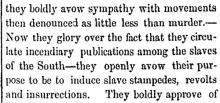Abolitionism of 1835 and of 1859.
The Boston Post presents an array of facts showing the progressive and aggressive spirit of the Abolition organization. It shows that in 1835 it pointedly condemned the incendiary doctrines which it now advocates and is striving to put into practice. Then the Abolitionists indignantly disclaimed any intention directly or indirectly to incite slave insurrections or slave stampedes. They even repudiated the charge that they ever had been guilty of circulating incendiary publications among Southern slaves, and protested that they held any attempt to create a slave revolt as little less criminal than murder. Now they boldly avow sympathy with movements then denounced as little less than murder.––Now they glory over the fact that they circulate incendiary publications among the slaves of the South––they openly avow their purpose to be to induce slave stampedes, revolts and insurrections. They boldly approve of the conduct of men who engage in servile insurrections and murder, and some of them are honest enough to admit that such insurrections as the Harper's Ferry Affair are the inevitable result of anti-slavery teaching. The Post gives the following extracts from an address of the Anti-Slavery Society of Massachusetts of 1835, signed by a committee of which Samuel J. Mya [May] was Chairman, and Wm. Lloyd Garrison and others were members:
"It is intimated that we are guilty of circulating incendiary publications among the Southern slaves. We utterly and indignantly deny this calumny, and we call for the [illegible].... and no means to address the slaves. Nothing can be further from our wishes than to excite the slave population.––We should consider any action of this kind as far worse than useless––as highly dangerous, and as little less criminal than murder. Why should we seek to promote insurrection?––What should we not lose by it? As merchants and mechanics, as citizens and parents, as patriots and Christians, we have as much to risk as others in this community; and we know that such an event would be the greatest calamity to the slaves, and to the cause of freedom. No anti-slavery society, and no person connected with any anti-slavery society, is believed to have ever circulated among the slaves any publication whatever––as is so often hinted, but never yet, we believe, distinctly charged, by the opposers of our cause. We solemnly pledge ourselves that, if it can be shown that any person connected with our cause, has ever circulated inflammatory tracts among the slaves, or with a view to be read by them, we will publicly renounce him as a foe to the peace of society, and to the best interests of the oppressed."
* * * *
"The attempt is made to delude the community into the belief that Abolitionists are willing to secure the emancipation of the slaves at the expense of the safety of the whites.––We deny this charge in the most pointed manner. We have never advocated the right of physical resistance on the part of the oppressed. We assure our assailants that we would not sacrifice the life of a single slaveholder, to emancipate every slave in the United States. On the contrary, we are fully persuaded that the triumph of our principles is the only means of tranquility or safety for our country."
The Post adds:
This address indignantly repels the charge of violating the Constitution of the United States; to-day the doctrine of these agitators is that the Constitution is a covenant with death and an agreement with hell!
So far from denouncing Brown and his associates as foes to society, we see from this class of men, the Abolitionists, a universal sympathy with him; we see physical resistance of the slave boldly advocated as a measure of right; we see doctrines coolly urged that would carry destruction throughout the Southern States; and we even see Abolition clergymen so lost to a moral sense, so oblivious of what is due to public faith, as to hold up the insurrectionist as a pattern of piety and patriotism! And even our literary institutions are insulted by eulogies on his character and objects.
"Abolitionism of 1835 and of 1859," Jackson (MS) Mississippian, December 27, 1859, p. 2.

